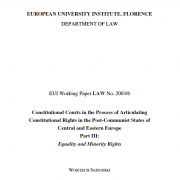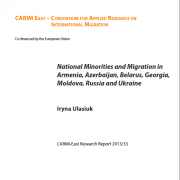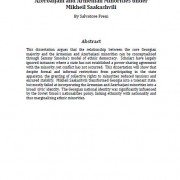In 2012, the OSCE High Commissioner on National Minorities issued the so-called Ljubljana Guidelines: recommendations for member states to foster integration in increasingly diverse societies. A few years later, in December 2019, the High Commissioner commissioned a study to strengthen these recommendations and assist member states in their implementation. Therefore on behalf of the OSCE […]
Read more
This paper analyses the constitutional rights by the constitutional courts of Central and Eastern Europe (CEE), in particular, the equality and anti-discrimination clauses. The CEE is a wide and untidy mosaic of ethnic, national and religious minorities, and communism often tried to stop any open expression under the official national unity. After the fall of communism, nationalistic […]
Read more
This paper intends to look at the interconnection of minority and migration issues.It aims to investigate the interrelation of the minority regimes adopted by Armenia, Azerbaijan, Belarus, Georgia, Moldova, Russia and Ukraine, and migration. It seeks to open up the discussion on the extent to which certain policies and rights for national minorities can be […]
Read more
This dissertation argues that the relationship between the core Georgian majority and the Armenian and Azerbaijani minorities can be conceptualised through Sammy Smooha’s model of ethnic democracy. Scholars have largelyignored instances where a state has not established a power‐sharing agreement with the minority, yet conflict has not occurred. This dissertation will show that despite formal […]
Read more




